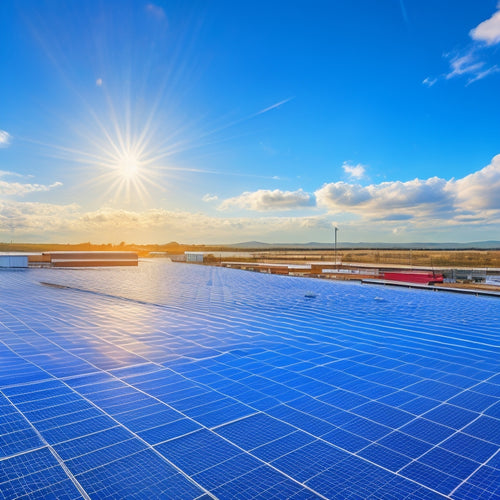
Buying Home Energy Storage Systems: What to Consider
Share
When you're buying a home energy storage system, focus on several key factors: your energy needs, battery capacity, and maintenance costs. Analyze your past energy usage to anticipate future demands, especially if you plan to add electric vehicles or new appliances. Look for systems with durable batteries that offer long lifespans, like lithium-ion, which can last 10-15 years. Consider installation options and warranties to minimize long-term maintenance hassles. Finally, evaluate your desire for energy independence and backup power during outages. The choices you make now impact your system's efficiency and savings down the line, opening up further understanding.
At a Glance
- Assess the cost-benefit analysis, including initial investment and long-term savings on utility bills to evaluate financial viability.
- Evaluate battery capacity and lifespan to ensure the system meets your energy needs and provides reliable performance over time.
- Analyze energy usage patterns to determine appropriate system sizing and optimize energy storage during peak consumption times.
- Consider the potential for energy independence by integrating solar energy and reducing reliance on traditional utility grids.
- Review durability and maintenance requirements of various systems to minimize long-term upkeep costs and ensure reliable performance.
Energy Independence and Savings
When considering home energy storage systems, it's essential to weigh the cost-benefit analysis against your potential savings.
With advancements in battery technology and decreasing system costs, you might find that investing in these systems not only enhances your energy independence but also provides the opportunity to go off-grid.
Cost-Benefit Analysis
As energy costs continue to rise, evaluating the cost-benefit analysis of home energy storage systems becomes essential for homeowners seeking energy independence and savings.
You'll want to start by examining your initial investment in a storage system. This includes the purchase price, installation costs, and any necessary upgrades to your home's electrical system. While this upfront cost may seem overwhelming, consider the long-term savings on your utility bills and the potential earnings from energy resale during peak times.
Next, look at your return expectations. Calculate how much you'll save monthly with stored energy, factoring in your local energy rates and any available incentives or tax credits. This helps you understand how quickly you can recoup your investment.
Additionally, consider the increased resilience against power outages, which adds a layer of financial security that's often overlooked.
Off-Grid Potential
The off-grid potential of home energy storage systems offers homeowners an attractive opportunity for energy independence and significant savings. By integrating solar energy, you can utilize the power of the sun to fuel your home, reducing reliance on traditional utility grids. This not only means lower monthly bills but also a buffer against fluctuating energy prices.
One of the standout features of these systems is their scalability. You can start with a smaller setup and expand it as your energy needs grow or as your budget allows. This flexibility means you can customize your energy solution to fit your lifestyle, whether you're a weekend warrior or a full-time off-grid enthusiast.
Moreover, achieving energy independence can provide peace of mind. You'll be less vulnerable to power outages and grid failures, ensuring a steady energy supply regardless of external conditions.
With the right combination of solar integration and storage capacity, you can create a self-sufficient system that enables you to take charge of your energy future. Ultimately, investing in a home energy storage system could pave your way to both freedom and savings, redefining how you power your life.
Enhanced Grid Reliability
With home energy storage systems, you can enhance grid reliability by ensuring a steady power supply even during outages.
These systems not only provide backup power solutions but also increase your energy independence, reducing reliance on the grid.
By integrating renewable energy sources, homeowners can greatly lower their energy bills while minimizing waste, as noted in energy independence benefits.
As you investigate these benefits, it's important to comprehend how they can improve your overall energy resilience.
Increased Energy Independence
In recent years, the push for energy independence has gained significant momentum, particularly as individuals and businesses seek ways to improve grid reliability. Investing in home energy storage systems can play an essential role in achieving this goal. By utilizing renewable energy sources, you can gain self-sufficiency benefits that reduce your reliance on the grid. This shift not only enables you but also contributes to greater energy security.
When you store energy generated from solar panels or wind turbines, you're effectively creating a buffer against fluctuations in power supply. This independence allows you to weather outages or price spikes without being at the mercy of external energy providers. The ability to control your energy usage increases your resilience; you can decide when to draw from your storage or the grid.
Moreover, in an era where climate change and energy instability loom large, your commitment to energy independence can inspire others in your community. As you investigate the options for home energy storage, consider how these systems can boost your self-sufficiency while enhancing grid reliability, ultimately laying the groundwork for a more sustainable future.
Backup Power Solutions
Investing in home energy storage systems not only boosts your energy independence but also improves grid reliability through effective backup power solutions. When the grid goes down, your stored energy can keep essential appliances running, ensuring you're not left in the dark. This capability is vital for maintaining comfort and safety, especially during severe weather events or power outages.
Integrating solar energy with your storage system amplifies these benefits. By capturing solar power during the day, you can store excess energy for later use. This not only reduces your dependence on the grid but also minimizes your environmental impact, supporting a cleaner, sustainable energy future.
Moreover, reliable backup power solutions contribute to overall grid stability. When more homes employ energy storage, it alleviates stress on the grid during peak demand, lowering the risk of outages.
You can confidently enjoy the freedom that comes with knowing your home is prepared for unforeseen circumstances. As you consider a home energy storage system, prioritize options that offer seamless solar integration and strong backup capabilities to maximize your energy independence and enhance your grid resilience.
Battery Capacity and Lifespan
When choosing a home energy storage system, understanding battery capacity is essential, as it directly impacts how much energy you can store and use.
Evaluating your energy demands and identifying high-power appliances will help determine the appropriate battery type and size.
You'll also want to evaluate lifespan factors, since different batteries age at varying rates based on usage and environmental conditions.
For instance, lithium-ion batteries are favored for longer durations and deeper discharge, making them ideal for residential needs top solar battery brands.
Understanding Battery Capacity
Understanding battery capacity is vital for anyone considering a home energy storage system. Battery capacity, typically measured in kilowatt-hours (kWh), indicates how much energy the system can store. The higher the capacity, the more energy you can use during peak times or outages, giving you greater freedom to manage your energy needs.
When evaluating battery capacity, consider the battery chemistry used in the system. Lithium-ion batteries, for instance, generally offer higher energy density and longer life compared to lead-acid batteries. This means they can store more energy in a smaller space and endure more charging cycles, translating to better overall performance and efficiency.
It's important to match your energy consumption patterns with the battery's capacity. If you're aiming for energy independence, a larger capacity may be necessary to sustain your lifestyle during outages or when solar production is low.
Additionally, keep in mind that as batteries age, their capacity may diminish, affecting their performance. Understanding these subtleties allows you to choose a system that aligns with your energy goals and maximizes your investment in home energy storage.
Evaluating Lifespan Factors
Evaluating lifespan factors in home energy storage systems is essential for making an informed choice that meets your long-term energy needs.
One of the key aspects to evaluate is battery chemistry. Different chemistries, like lithium-ion or lead-acid, have varying lifespans and performance characteristics. Lithium-ion batteries often offer a longer lifespan, typically around 10-15 years, while lead-acid batteries may only last 3-5 years.
You should also look at the cycle life, which indicates how many charge and discharge cycles a battery can undergo before its capacity notably diminishes. A higher cycle life means you'll replace your system less frequently, saving you money in the long run.
Additionally, reflect on the environmental impact of the battery chemistry you choose. Some battery technologies have a more sustainable profile than others, affecting not only your energy independence but also your carbon footprint.
Selecting Based on Energy Usage
To select the right home energy storage system, you need to assess your energy needs carefully.
Start by calculating your peak usage times to understand when you consume the most power. This information will guide you in choosing a system that effectively meets your household demands.
Additionally, consider the types of energy storage solutions available, as they vary in capacity, efficiency, and lifespan, which can greatly impact your decision.
Assess Your Energy Needs
As you contemplate a home energy storage system, it's crucial to evaluate your energy needs, since this will directly influence the effectiveness and efficiency of your investment.
Start by examining your energy consumption over the past year. You'll want to identify patterns in your usage, such as peak times and seasonal variations. This analysis helps you determine how much energy you typically use and when you need it most.
Next, think about your lifestyle and any future changes that may affect your energy needs. If you plan to add electric vehicles, home offices, or energy-efficient appliances, factor those into your calculations.
Understanding your usage patterns not only allows you to choose the right size for your energy storage system but also guarantees that you're capturing energy when it's most advantageous.
Consider how much energy you want to store for backup during outages or when relying on renewable sources like solar.
A clearer depiction of your consumption habits will guide you in selecting a system that aligns with your energy goals, giving you the freedom to manage your energy usage effectively and sustainably.
Calculate Peak Usage Times
Identifying peak usage times is essential for optimizing your home energy storage system. Understanding your peak demand helps you utilize your energy storage effectively, allowing you to reduce costs and improve efficiency.
Start by analyzing your household's usage patterns throughout the day and week. Consider when your energy consumption spikes—typically in the morning as you prepare for the day and in the evening when activities ramp up.
By pinpointing these peak usage times, you can strategically charge your energy storage system during off-peak hours when electricity rates are lower.
Next, track your usage over time. Use smart meters or energy monitoring systems to gather data on your consumption habits.
This understanding will enable you to tailor your energy storage strategy, ensuring you have sufficient power stored to cover peak demand without over-relying on the grid.
Lower Long-Term Maintenance Costs
When you invest in home energy storage systems, you'll likely notice lower long-term maintenance costs.
These systems often require fewer repairs over time due to their durable design and advanced technology.
As a result, you can save money and reduce stress associated with unexpected maintenance expenses.
Reduced Repair Expenses
Investing in home energy storage systems can greatly lower your long-term maintenance costs by reducing repair expenses. When you opt for a high-quality system, you're less likely to face frequent repairs, which can drain your finances and time. Many manufacturers offer sturdy repair warranties, ensuring that if something does go wrong, you won't be left to cover the costs alone.
However, the cost-saving benefits start with proper installation considerations. A well-installed system not only performs better but also lasts longer, minimizing the likelihood of malfunctions. It's vital to choose a reputable installer who understands the complexities of energy storage systems. This decision can greatly impact your system's reliability and overall performance.
Moreover, regular maintenance checks can catch potential issues early, preventing costly repairs down the line. By staying proactive, you enable yourself to enjoy the freedom that comes with energy independence.
To summarize, when you invest in a quality home energy storage system with a focus on proper installation and repair warranties, you're making a strategic move to reduce repair expenses and enhance your long-term financial stability.
Frequently Asked Questions
What Are the Initial Costs of Home Energy Storage Systems?
The initial costs of home energy storage systems include various battery types and installation costs. You'll need to evaluate these expenses against potential savings and energy independence, ensuring you make a choice that fits your needs.
How Do I Choose the Right Installation Company?
To choose the right installation company, assess their installation qualifications and read customer reviews. Compare multiple options to guarantee you're getting quality service that meets your needs and supports your energy independence goals.
Can I Integrate Energy Storage With Existing Solar Panels?
Imagine a harmonious dance between solar panels and energy storage. You can seamlessly integrate them, ensuring battery compatibility and smooth solar inverter integration. This collaboration enables you to utilize energy and welcome true freedom in your home.
Are There Government Incentives for Buying Energy Storage Systems?
Yes, there are government incentives for energy storage systems. You can benefit from federal tax credits and various state rebates, which greatly reduce your initial investment, enhancing your energy independence while promoting sustainable practices.
What Happens During a Power Outage With These Systems?
During a power outage, your energy storage system kicks in, providing backup power. Battery performance varies, and the outage duration will determine how long you can rely on stored energy, ensuring your freedom from grid dependency.
Explore More
In your quest for energy independence, investing in a home energy storage system can feel like finding the Holy Grail. By considering factors like battery capacity and your specific energy needs, you're not just enhancing grid reliability; you're also laying the groundwork for long-term savings. As you weigh your options, remember: a smart choice today could lead to a more sustainable and resilient tomorrow. Welcome the future of energy, and let your home shine brightly, come what may.
Related Posts
-

Top Eco-Friendly Camping Equipment for a Sustainable Adventure
When you're camping with the planet in mind, opt for eco-friendly gear like tents made from recycled materials and bi...
-

Top 10 Off Grid Camping Gear Must-Haves
When you're off-grid camping, the right gear is crucial for a smooth expedition. Start with a durable, weather-resist...
-

Commercial Solar Energy
As you consider powering your business with commercial solar energy, you'll uncover it offers a triple benefit: signi...


